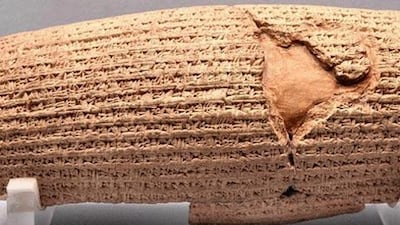Given the steadily declining relations between the UK and Iran, with accusations of election-rigging and agent-provocateurism bouncing back and forth, it is remarkable that a collegial spirit has managed to endure between the Islamic republic and the British archaeological establishment for this long. Still, whatever hopes there might have been for potsherd diplomacy would now seem to be dashed. Tehran has officially cut its ties with the British Museum. "We consider it a closed chapter," Hassan Mohseni of Iran's cultural heritage and tourism organisation told the press this week. Under the circumstances, it's a suggestive figure of speech.
The proximal cause of the breakdown was an argument over a 2,500-year-old clay tablet. The British Museum had agreed to lend the National Museum of Iran the Cyrus Cylinder for a special exhibition. But it delayed sending the piece, first pleading worries about political unrest and then claiming an important new discovery that couldn't wait to be investigated further. Iran objected that it had already spent $200,000 (Dh735,000) improving security at its museum especially for the cylinder, that Britain had fobbed it off with excuses four times in a row and that enough was enough. It has promised to alert the United Nations Educational, Scientific and Cultural Organisation (Unesco). Tremble, ye mighty.
The British Museum replied to the effect that it had already told Iran that the object would not be sent until July and couldn't see what the problem was. The latest show of temper "comes as a great surprise", the museum said, with what must seem like enraging nonchalance. Clearly, someone is telling either less or rather more than the full story. And the tablet itself may supply a clue as to who.
The Cyrus Cylinder is a spindle-shaped lump of clay stamped with 45 lines of text. These contain a statement in Akkadian cuneiform script made by the Persian ruler Cyrus the Great on the happy occasion, in 539BC, of his conquest of Babylon. Cyrus (or someone writing in his name) denounces the vanquished emperor, asserts that he himself is more acceptable to the senior deity Marduk and makes a series of pledges and boasts about living conditions for the conquered people.
It is a political document in several senses: ingratiatingly reformist, reassuringly conservative - much is made of the authenticity of Cyrus's lineage and his plans to restore neglected temples - and, perhaps, prototypically enlightened. In 1967, Iran's then-Shah Mohammad Reza Pahlavi wrote a book calling the cylinder "the world's first declaration of human rights". It became an emblem of pre-revolutionary Iran's civilising ambitions, a Janus-faced endorsement of both democracy and kingship, which naturally suited the Pahlavis.
Mangled translations circulated which guaranteed the right to self-government and a minimum wage, neither of which seem to be mentioned in the Akkadian edition. Cyrus's opportunistic appeals to Marduk have been recast as statements of religious liberty. One way or another, the cylinder was incorporated into the national myth. And there, despite Iran's sharply altered scene, it has remained. Perhaps this can account for Tehran's sudden severing of relations with the British Museum. The latest excuse the museum offered for not forking over the goods was that it had found a couple of additional tablets in one of its drawers. These duplicate parts of the Cyrus inscription and may shed light on its missing or obscure passages.
It's exciting news: we may finally get a sense of exactly what this paragon of kings told his people in order to assert the legitimacy of his rule. Did he explain how to sort out the system of fuel subsidies? Did he give filmmakers carte-blanche and praise the achievements of rock musicians? What might the voice of Cyrus, speaking across the millennia, have to say about the right to public protest? The British Museum has offered to make Iran the first public venue for the new tablets just as soon as it can work out what they say. One imagines it will hold considerable interest for Iran's historically-minded patriots.
But for Tehran, the latest delay goes too far. The British Museum is "acting politically", according to Hamid Baqaei, the republic's vice president. The deal is off. It wouldn't be the first time the British have been slippery, and the dispute does carry a suggestion of Elginism. Perhaps the museum really can't be trusted to meet its promises. Yet it's odd that Iran should be in a hurry to pronounce the chapter closed, just when it's getting interesting. One could be forgiven for thinking the republic would rather leave this particular book on the shelf.

